Huawei Technologies, the Chinese telecommunications equipment supplier fighting a U.S. sales ban, kicks off a trade secrets lawsuit in the United States on June 3 against a former employee who has sought to turn the case into a referendum on Huawei’s corporate behavior.
The trial, involving salacious allegations of corporate espionage, racketeering and a secret database of rivals’ technology, promises to keep Huawei in the spotlight amid a U.S. blacklisting and pressure on allies not to buy its networking gear over security concerns.





